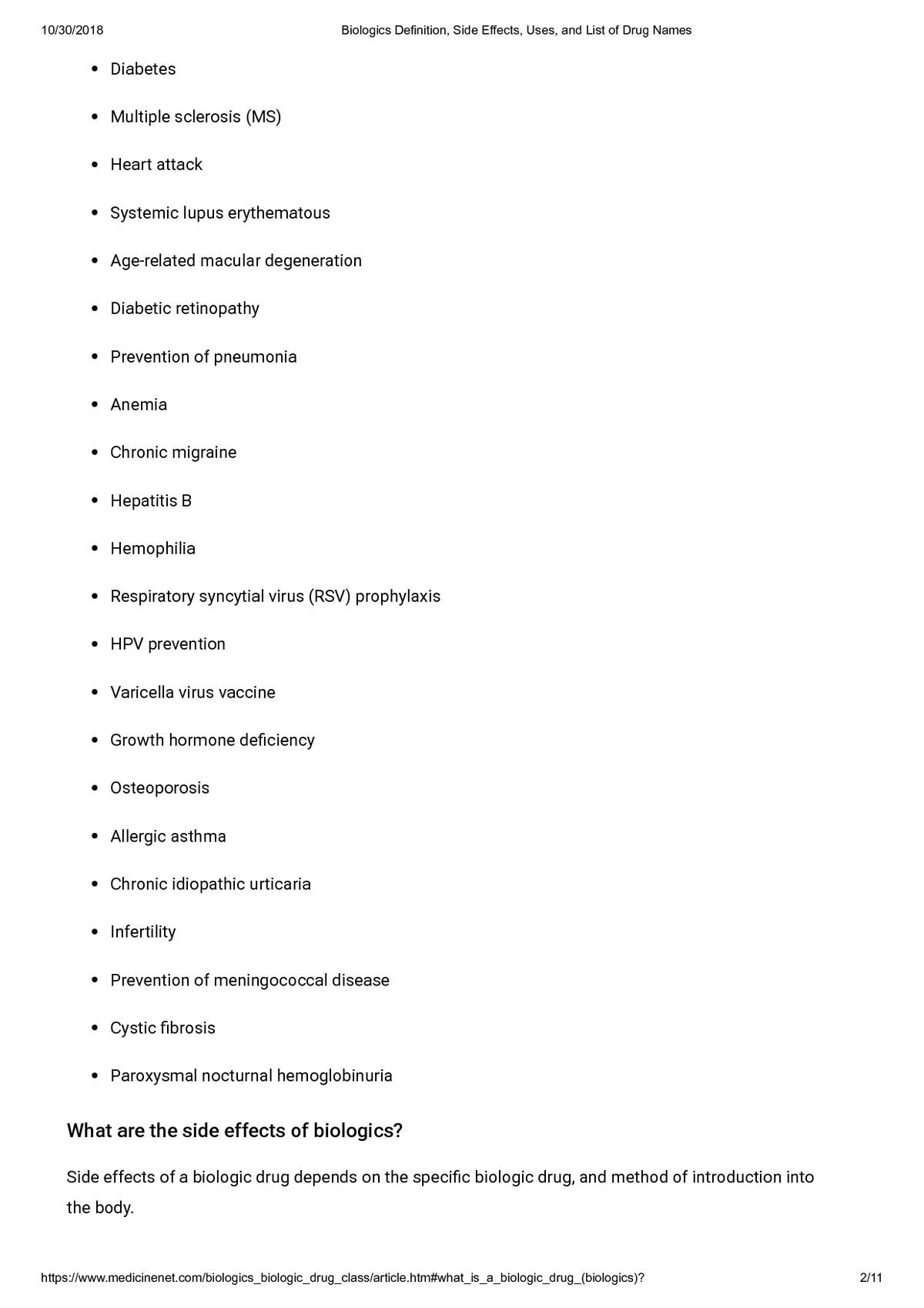
Contents
- 1 Biologics (Biologic Drug Class)
- 1.0.1 What are the side effects of biologics?
- 1.0.2 What preparations are available for biologics?
- 1.0.3 Which drugs interact with biologics?
- 1.0.4 Are biologics safe to use during pregnancy or while breastfeeding?
- 1.0.5 What brand and generic names are available for biologics?
- 1.0.6 Subscribe to MedicineNet’s Arthritis Newsletter
- 1.0.7 Summary
Biologics (Biologic Drug Class)
Biologic drugs are used for treatment of numerous diseases and conditions, and are the most advanced therapies available. Some biologic drugs are used for the treatment of Crohn’s disease, ulcerative colitis, rheumatoid arthritis, and other autoimmune diseases.
Available biologics have revolutionized cancer treatment, delayed or reversed immune-related conditions, improved the lives of people with rare diseases, and have given hope to many patients with previously limited treatment options.
Examples of medical uses for biologic drugs include:
- Various cancers
- Rheumatoid arthritis (RA)
- Ankylosing spondylitis
- Crohn’s disease
- Ulcerative colitis
- Psoriasis
- Diabetes
- Multiple sclerosis (MS)
- Heart attack
- Systemic lupus erythematous
- Age-related macular degeneration
- Diabetic retinopathy
- Prevention of pneumonia
- Anemia
- Chronic migraine
- Hepatitis B
- Hemophilia
- Respiratory syncytial virus (RSV) prophylaxis
- HPV prevention
- Varicella virus vaccine
- Growth hormone deficiency
- Osteoporosis
- Allergies/asthma
- Chronic idiopathic urticaria
- Infertility
- Prevention of meningococcal disease
- Cystic fibrosis
- Paroxysmal nocturnal hemoglobinuria
What are the side effects of biologics?
Side effects of biologic drugs depend on the specific drug and method of introduction into the body.
- Most biologic drugs have the potential to cause allergic reactions.
- Biologic drugs used for rheumatoid arthritis, psoriasis, and other immune-related disorders suppress the immune system and increase the risk of infections.
- Injection-based biologic drugs can cause injection site reactions.
- Intravenous biologic drugs can cause infusion reactions.
These side effects vary depending on the biologic drug and may or may not occur in every case.
Common side effects of biologic drugs include:
Other side effects of biologic drugs include:
- Shortness of breath
- Peripheral edema
- Headache
- Fever
- Muscle aches and pain
- Decreased appetite
- Increased triglyceride levels
- Insomnia
- Abdominal pain
- Back pain
- Dizziness
- Infusion reactions
Serious side effects of biologic drugs include:
- Low blood pressure
- Anaphylaxis
- Serious infections
- Cancer
- Serum sickness
- Autoimmune thyroiditis
- Arterial and venous blood clots
- Congestive heart failure
- Bleeding
- Interstitial lung disease
- Hepatitis
- Generation of antibodies
- Enterocolitis
- Gastrointestinal perforation
- Mucositis
- Stomatitis
- Anemia
- Reduced white blood cell counts
- Hypothyroidism
What preparations are available for biologics?
Biologic drugs are administered by injection or infusion because they are proteins that are quickly digested and inactivated if taken orally. Therefore, biologic drugs are supplied as powders for infusion or solutions for injection.
Which drugs interact with biologics?
- Biologic drugs, such as adalimubab (Humira), that affect the immune system may interfere with the effectiveness of vaccines. Live vaccines, including attenuated vaccines, should not be used while patients are being treated with biologics that affect the immune system. Patients should complete all recommended immunizations prior to receiving these types of biologic drugs. Prescreening for dormant tuberculosis (TB) is generally recommended.
- Serious infections are more likely to occur when biologic drugs that suppress the immune system are combined with other drugs that also suppress the immune system.
Are biologics safe to use during pregnancy or while breastfeeding?
- Most biologic drugs have not been adequately studied in pregnant women or women who are breastfeeding.
- Some biologic drugs, such as follitropin alpha (Gonal f), nivolumab (Opdivo), and pembrolizumab (Keytruda), may be harmful to the fetus based on their mechanism of action and results from animal studies.
- Some biologic drugs may be present in breast milk. Mothers who are breastfeeding should discuss with their doctors whether to stop or discontinue the biologic drug, as many drugs are excreted in breast milk and may have serious adverse effects on the infant.
What brand and generic names are available for biologics?
List of examples of brand and generic biologic drugs available in the US:
- abatacept (Orencia)
- abciximab (ReoPro)
- abobotulinumtoxinA (Dysport)
- adalimumab (Humira)
- adalimumab-atto (Amjevita)
- ado-trastuzumab emtansine (Kadcyla)
- aflibercept (Eylea)
- agalsidase beta (Fabrazyme)
- albiglutide (Tanzeum)
- aldesleukin (Proleukin)
- alemtuzumab (Campath, Lemtrada)
- alglucosidase alfa (Myozyme, Lumizyme)
- alirocumab (Praluent)
- alteplase, cathflo activase (Activase)
- anakinra (Kineret)
- asfotase alfa (Strensiq)
- asparaginase (Elspar)
- asparaginase erwinia chrysanthemi (Erwinaze)
- atezolizumab (Tecentriq)
- basiliximab (Simulect)
- becaplermin (Regranex)
- belatacept (Nulojix)
- belimumab (Benlysta)
- bevacizumab (Avastin)
- bezlotoxumab (Zinplava)
- blinatumomab (Blincyto)
- brentuximab vedotin (Adcetris)
- canakinumab (Ilaris)
- capromab pendetide (ProstaScint)
- certolizumab pegol (Cimzia)
- cetuximab (Erbitux)
- collagenase (Santyl)
- collagenase clostridium histolyticum (Xiaflex)
- daclizumab (Zenapax)
- daclizumab (Zinbryta)
- daratumumab (Darzalex)
- darbepoetin alfa (Aranesp)
- denileukin diftitox (Ontak)
- denosumab (Prolia, Xgeva)
- dinutuximab (Unituxin)
- dornase alfa (Pulmozyme)
- dulaglutide (Trulicity)
- ecallantide (Kalbitor)
- eculizumab (Soliris)
- elosulfase alfa (Vimizim)
- elotuzumab (Empliciti)
- epoetin alfa (Epogen/Procrit)
- etanercept (Enbrel)
- etanercept-szzs (Erelzi)
- evolocumab (Repatha)
- filgrastim (Neupogen)
- filgrastim-sndz (Zarxio)
- follitropin alpha (Gonal f)
- galsulfase (Naglazyme)
- glucarpidase (Voraxaze)
- golimumab (Simponi)
- golimumab injection (Simponi Aria)
- ibritumomab tiuxetan (Zevalin)
- idarucizumab (Praxbind)
- idursulfase (Elaprase)
- incobotulinumtoxinA (Xeomin)
- infliximab (Remicade)
- infliximab-dyyb (Inflectra)
- interferon alfa-2b (Intron A)
- interferon alfa-n3 (Alferon N Injection)
- interferon beta-1a (Avonex, Rebif)
- interferon beta-1b (Betaseron, Extavia)
- interferon gamma-1b (Actimmune)
- ipilimumab (Yervoy)
- ixekizumab (Taltz)
- laronidase (Aldurazyme)
- mepolizumab (Nucala)
- methoxy polyethylene glycol-epoetin beta (Mircera)
- metreleptin (Myalept)
- natalizumab (Tysabri)
- necitumumab (Portrazza)
- nivolumab (Opdivo)
- obiltoxaximab (Anthim)
- obinutuzumab (Gazyva)
- ocriplasmin (Jetrea)
- ofatumumab (Arzerra)
- olaratumab (Lartruvo)
- omalizumab (Xolair)
- onabotulinumtoxinA (Botox)
- oprelvekin (Neumega)
- palifermin (Kepivance)
- palivizumab (Synagis)
- panitumumab (Vectibix)
- parathyroid hormone (Natpara)
- pegaspargase (Oncaspar)
- pegfilgrastim (Neulasta)
- peginterferon alfa-2a (Pegasys)
- peginterferon alfa-2b (PegIntron, Sylatron)
- peginterferon beta-1a (Plegridy)
- pegloticase (Krystexxa)
- pembrolizumab (Keytruda)
- pertuzumab (Perjeta)
- ramucirumab (Cyramza)
- ranibizumab (Lucentis)
- rasburicase (Elitek)
- raxibacumab
- reslizumab (Cinqair)
- reteplase (Retavase)
- rilonacept (Arcalyst)
- rimabotulinumtoxinB (Myobloc)
- rituximab (Rituxan)
- romiplostim (Nplate)
- sargramostim (Leukine)
- sebelipase alfa (Kanuma)
- secukinumab (Cosentyx)
- siltuximab (Sylvant)
- tbo-filgrastim (Granix)
- tenecteplase (TNKase)
- tocilizumab (Actemra)
- trastuzumab (Herceptin)
- ustekinumab (Stelara)
- vedolizumab (Entyvio)
- ziv-aflibercept (Zaltrap)
Subscribe to MedicineNet’s Arthritis Newsletter
By clicking "Submit," I agree to the MedicineNet Terms and Conditions and Privacy Policy. I also agree to receive emails from MedicineNet and I understand that I may opt out of MedicineNet subscriptions at any time.
Summary
A biologic drug is produced from living organisms or contains components of living organisms. Biologics include recombinant proteins, tissues, genes, allergens, cells, blood components, blood, and vaccines. Biologics are used to treat numerous diseases and conditions, such as anemia, chronic migraine, hepatitis B, hemophilia, respiratory syncytial virus (RSV) prophylaxis, HPV prevention, rheumatoid arthritis, and inflammatory bowel disease.


